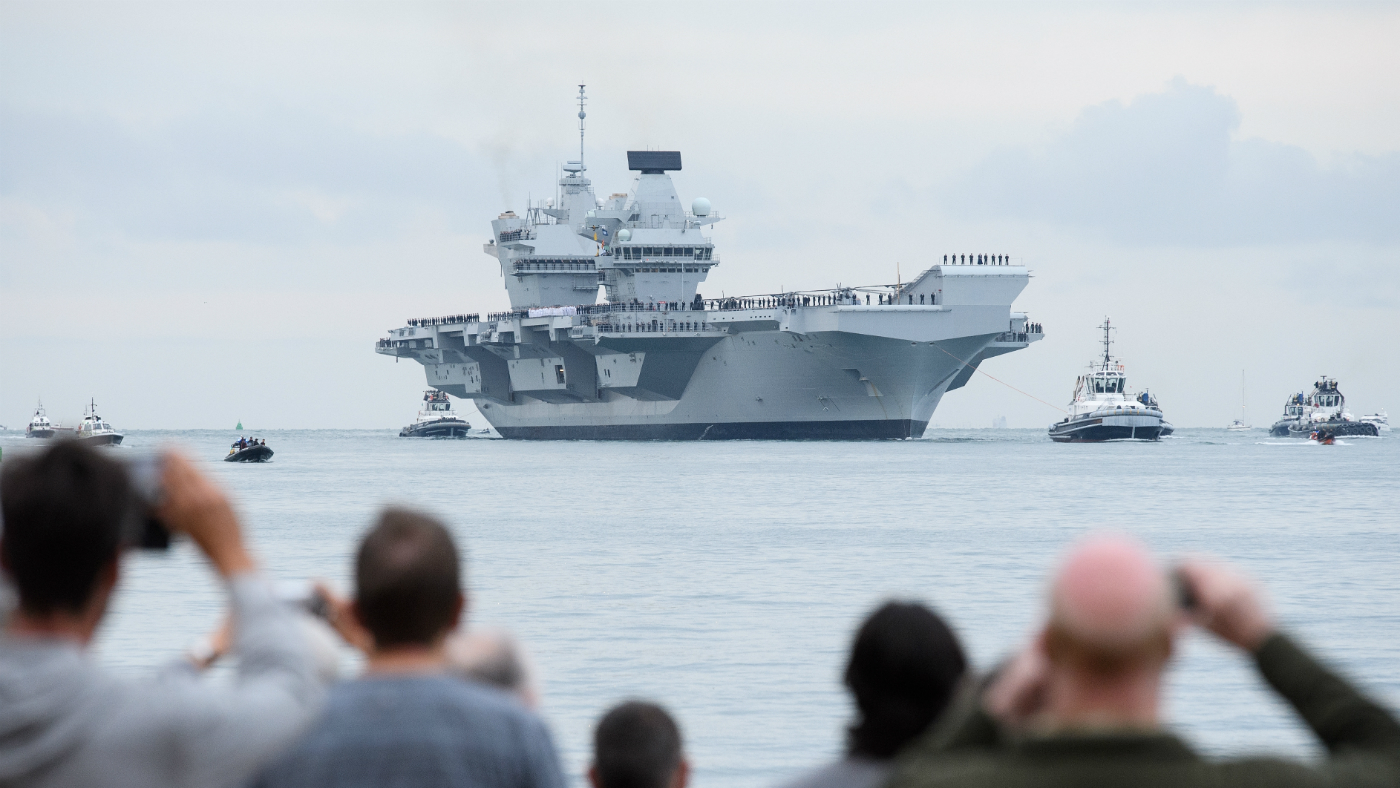Did China just threaten the UK with military action?
Beijing says deployment of new British aircraft carrier to the South China Sea could be interpreted as a ‘hostile action’

A free daily email with the biggest news stories of the day – and the best features from TheWeek.com
You are now subscribed
Your newsletter sign-up was successful
Concerns have been raised over an apparent threat to the UK issued by the Chinese government, which stated that the deployment of HMS Queen Elizabeth to the South China Sea could be interpreted as a “hostile action”.
The Ministry of Defence plans to deploy the Royal Navy’s new aircraft carrier to the Asia Pacific region on her first operational deployment in 2021, The Telegraph reports, adding that the UK Government is “keen to assert freedom of navigation through international waters” alongside other Western powers.
In response to the plans, Major General Su Guanghui, China’s defence attaché to the UK, told reporters: “If the US and UK join hands in a challenge or violated the sovereignty and territorial integrity of China, that would be hostile action.”
The Week
Escape your echo chamber. Get the facts behind the news, plus analysis from multiple perspectives.

Sign up for The Week's Free Newsletters
From our morning news briefing to a weekly Good News Newsletter, get the best of The Week delivered directly to your inbox.
From our morning news briefing to a weekly Good News Newsletter, get the best of The Week delivered directly to your inbox.
Sky News described it as “threatening a military response”.
This would be the second time in the past 12 months that London and Beijing have traded barbs over the prospect of British vessels encroaching on Chinese territorial waters. Last year China accused the UK of “provocative actions” when HMS Albion transited through the South China Sea close to the disputed Paracel Islands, which China controversially claims, despite the MoD insisting that the ship was in international waters.
China has been accused of colonising the South China Sea to expand its military reach - even going so far as to manufacture artificial islands - in violation of international law, prompting the US and UK to conduct regular freedom of navigation operations in the region. But with China’s latest threat, is the tension about to boil over into war?
What is the UK’s plan?
A free daily email with the biggest news stories of the day – and the best features from TheWeek.com
In February last year, the then foreign secretary Boris Johnson told Australian ministers that HMS Queen Elizabeth, one of the Royal Navy’s newest aircraft carriers, will conduct freedom of navigation patrols in the South China Sea region on her maiden deployment in 2021.
“One of the first things we will do with the two new colossal aircraft carriers that we have just built is send them on a freedom of navigation operation to this area, to vindicate our belief in the rules-based international system and in the freedom of navigation through those waterways which are absolutely vital for world trade,” Johnson said.
He was responding to the Chinese government’s belief that it has a historic right to a vast swathe of the South China Sea marked by what Beijing calls the “nine-dash line”, which includes a series of disputed uninhabited islands full of natural resources and fishing areas.
The Spratly Islands, near the Philippines, are the most contentious. The Japan Times reports that Beijing “has already set up an interconnected array of radar, electronic-attack facilities, missile batteries and airfields” on the archipelago.
The Independent reports that the West - and China’s neighbours - are “alarmed by what they see as Beijing’s expanding naval hegemony, the building of fortified islands and claiming disputed territorial waters, the issue of freedom of navigation has come increasingly to the fore”.
What has China said?
This week, US defence secretary Mark Esper called for help from allies - including the UK - to counter Beijing’s “attempts to disrupt the international order” and seek “domination” over the South China Sea.
In response, China stated that it will not tolerate what it calls a “violation of sovereignty”, and explicitly warned against any attempts to enter what it sees as its territorial waters.
Liu Xiaoming, China’s ambassador to the UK, said that the UK should cease attempting to “show its muscle” on behalf of a foreign power, believed to be the US, saying: “The UK should not do this dirty job for somebody else.”
He warned: “Do not enter Chinese territorial waters within 12 nautical miles. If you don’t do that, there shouldn’t be a problem. The South China Sea is wide enough to have free navigation of shipping.”
The UK Government stood firm by its plans, with a Downing Street spokesperson claiming: “The UK has enduring interests in the region and is committed to maintaining regional security. The presence of international navies in the South China Sea is normal and the royal navy is no exception to this.
“We remain committed to asserting rights of freedom of navigation at sea and in the air as provided for by international law.”
-
 Political cartoons for February 17
Political cartoons for February 17Cartoons Tuesday’s political cartoons include a refreshing spritz of Pam, winter events, and more
-
 Alexei Navalny and Russia’s history of poisonings
Alexei Navalny and Russia’s history of poisoningsThe Explainer ‘Precise’ and ‘deniable’, the Kremlin’s use of poison to silence critics has become a ’geopolitical signature flourish’
-
 Are Hollywood ‘showmances’ losing their shine?
Are Hollywood ‘showmances’ losing their shine?In The Spotlight Teasing real-life romance between movie leads is an old Tinseltown publicity trick but modern audiences may have had enough
